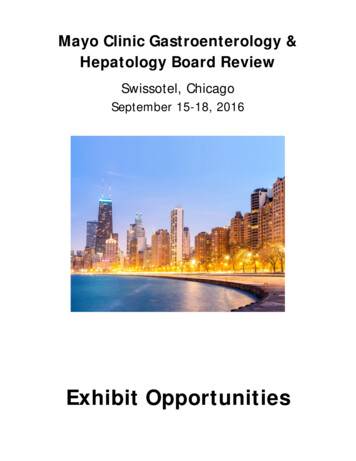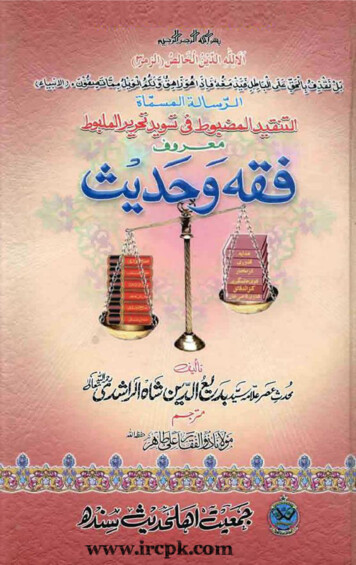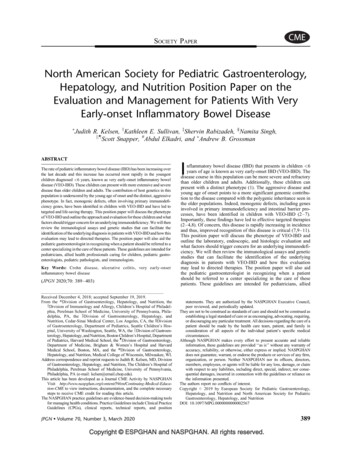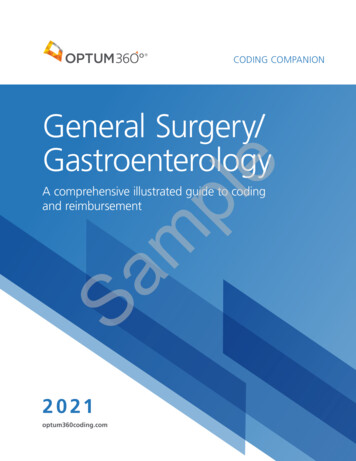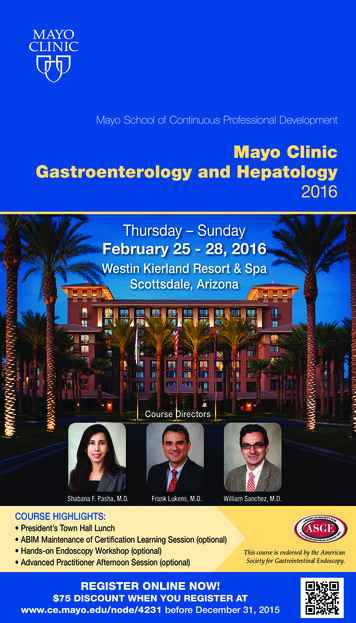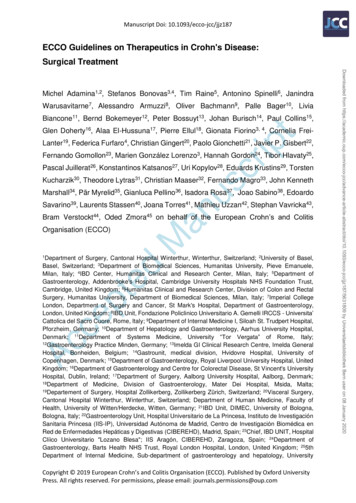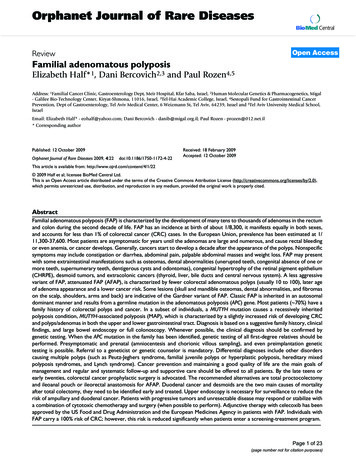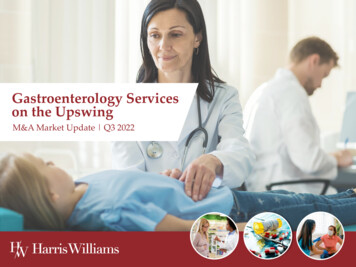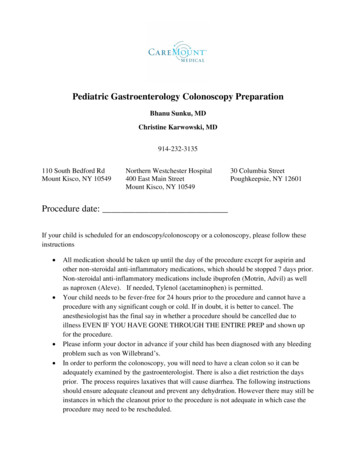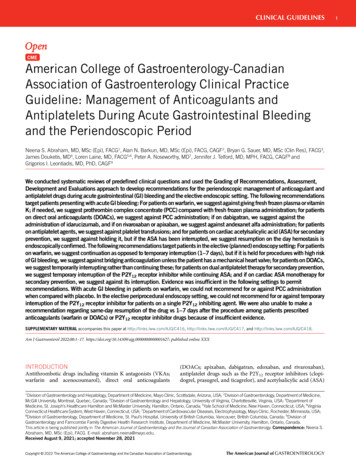
Transcription
Thisdocumentiscreatedforcomprehensive understanding of allaspects of 5 year Degree Program ofMDinRawalpindiGastroenterologyMedicalRawalpindi PakistanProgram MD GastroenterologyRawalpindi Medical University2019atUniversity
Program of MD GastroenterologyRawalpindi Medical University RawalpindiTable of contents
SNO.ContentSECTIONSE – I General Plan of the courseS1.Mission Statement2.Statutes3.Admission Criteria4.Registration and Enrolment5.Aims and objectives of the course (general & specific)6.Other required core competencies for the residents7.Electives/Rotations8.Scheme of the Course M.D Gastroenterology program9.General Road Map of the MD Degree Program of Rawalpindi Medical University inthe Discipline of Internal Medicine a diagrammatic representation10.Methods of Teaching & Learning during course conduction11.Tools of Assessment for the course12.Intermediate Examination of M.D Gastroenterology
13.Final Examination of M.D. Gastroenterology14.Submission / Evaluation of Synopsis15.Submission of Thesis16.Thesis Evaluation17.Award of MD Gastroenterology DegreeSECTION – IIThe Curriculum18.Details of the curriculum of MD Gastroenterology19.First year curriculum – Basic Sciences component20.First year curriculum – Clinical component21.Curriculum of clinical training of 2nd,3rd, 4th & 5th yearSECTION – III Research &Thesis writing22.Details about Research component &Thesis writingSECTION – IV Research Curriculum & Mandatory Workshops23.Details Research Curriculum & of Mandatory workshopsSECTION – V Mile Stones to be achieved by the residents
24.Charting the Road to Competence: Developmental Milestones for MD InternalMedicine Program at Rawalpindi Medical UniversitySECTION – VIEvaluation & Assessment strategies25.Evaluation & Assessment strategies a general overview26.Details of MD Gastroenterology Intermediate examination (written & clinical)27.Details of MD Gastroenterology Final examination (written & clinical)28.MD Gastroenterology Final thesis examinationSECTION – VII29.Log Book Templates30.Portfolio TemplatesLog Book & PortfolioSECTION – VIII References31.SECTION – IX Appendices (proformas/Forms)32.Multisource feed back proforma- 360⁰ evaluation------“Appendix A”33.Evaluation of resident by the Nurse regarding core competencies of the resident-----“Appendix B”
34.Proforma for patient Medication Record ------“Appendix C”35.Workplace Based Assessments- guidelines for assessment of Generic & specialtyspecific Competencies ------ Appendix “ D”36.Supervisor’s Annual Review Report------- Appendix “ E”37.Supervisors evaluation Proforma for continuous internal assessments Appendix “ F”38.Evaluation of resident by the faculty---------- Appendix “ G”39.Evaluation of faculty by the resident (Teaching Skills)------------ Appendix “ H”40.Evaluation of Faculty by the Resident (core competencies) Appendix “ I”41.Evaluation of program by the faculty------------ Appendix “ J”42.Evaluation of program by the resident----------- Appendix “ k”Guidelines for program evaluation-------------- Appendix “ L”SECTION – X Miscellaneous
PREFACEThe horizons of Medical Education are widening & there has been a steady rise of global interest in Post Graduate Medical Education, anincreased awareness of the necessity for experience in education skills for all healthcare professionals and the need for some formal recognitionof postgraduate training in Gastroenterology.We are seeing a rise in the uptake of places on postgraduate courses in medical education, more frequent issues of medical education journalsand the further development of e-journals and other new online resources. There is therefore a need to provide active support in Post GraduateMedical Education for a larger, national group of colleagues in all specialties and at all stages of their personal professional development. If wewere to formulate a statement of intent to explain the purpose of this log book, we might simply say that our aim is to help clinical colleagues toteach and to help students to learn in a better and advanced way. This book is a state of the art log book with representation of all activities of theMD Gastroenterology program at RMU.A summary of the curriculum is incorporated in the logbook for convenience of supervisors and residents.MD curriculum is based on six Core Competencies of ACGME (Accreditation Council for Graduate Medical Education)includingPatient Care, Medical Knowledge, System Based Practice, Practice Based Learning, Professionalism, Interpersonal and Communication Skills. Aperfect monitoring system of a training program including monitoring of teaching and learning strategies, assessment and Research Activitiescannot be denied so we at RMU have incorporated evaluation by Quality Assurance Cell and its comments in the logbook in addition to evaluationby University Training Monitoring Cell (URTMC). Reflection of the supervisor in each and every section of the logbook has been made sure toensure transparency in the training program. The mission of Rawalpindi Medical University is to improve the health of the communities and weserve through education, biomedical research and health care. As an integral part of this mission, importance of research culture and establishmentof a comprehensive research structure and research curriculum for the residents has been formulated and a separate journal for researchpublications of residents is available.Prof. Muhammad Umar(Sitara-e-Imtiaz)(MBBS, MCPS, FCPS, FACG,FRCP (Lon), FRCP (Glasg), AGAF)Vice ChancellorRawalpindi Medical University& Allied Hospitals
CONTRIBUTIONSSR.NO1.NAME & DESIGNATIONPROF MUHAMMAD UMAR, S.IMBBS, MCPS, FCPS (PAK), FACG (USA), FRCP (L),FRCP (G), ASGE-M(USA), AGAF (USA)CONTRIBUTIONS IN FORMULATION OF LOG BOOK OF MEDICINE & ALLIEDGuidance regarding technical matters of Log Book of MD Gastroenterology& also Log Book for MD Gastroenterology rotations.Vice Chancellor & CEORawalpindi Medical University & AlliedHospitalsRawalpindi2.DR BUSHRA KHAR, MBBS.FCPSEx-Professor of MedicineHead Department of GastroenterologyHoly Family Hospital Rawalpindi3.DR AQSA NASEER, MBBS.FCPS.ESEGHSR GastroenterologyHoly Family HospitalRawalpindi4.MR. JAHANZEB KHANComputer OperatorHoly Family Hospital, RawalpindiGuidance regarding technical matters of Log Book of MD Gastroenterology& also Log Book for MD Gastroenterology rotations. Provision of requirednumber of clinical procedures and educational activities for each yearseparately and rotation of log books of MD gastroenterology and log bookMD gastroenterology rotations.Over all synthesis, structuring & over all write up of Curriculum of MDGastroenterology, Log Book of MD Gastroenterology and also LogBook for MD Gastroenterology rotations under guidance ofProf.Muhammad Umar Vice Chancellor, Rawalpindi Medical University,Rawalpindi.Also Proof reading & synthesis of final print version of Log Books of MDGastroenterology Rotation Log Book.8
SECTION – IMISSION STATEMENTThe mission of Gastroenterology Residency Program of Rawalpindi Medical University is:1. To passionately teach our trainees as we have been taught by those who preceded us.2. To impart knowledge and skills of gastroenterology in our trainees.3. To support and contribute to the research mission of our gastroenterology department, nation, and the world bypursuing new knowledge, whether at the bench or bedside.4. To promote the translation of the latest scientific knowledge to the bedside to improve our understanding ofdisease pathogenesis and ensure that all patients receive the most scientifically appropriate and up to date care.5. To extend our talents outside the walls of our hospitals and clinics, to promote the health and well-being ofcommunities, locally, nationally, and internationally.6. To serve as proud ambassadors for the mission of the Rawalpindi Medical University MD gastroenterologyResidency Program for the remainder of our professional lives.9
STATUTES1. Nomenclature:Nomenclature of the Proposed Course The name of degree programme shall be MD Gastroenterology. This name is wellrecognized and established for the last many decades worldwide.2. Course Title:MD Gastroenterology3. Training Centres:Departments of Gastroenterology at Rawalpindi Medical University (RMU).4. Duration of Course: The duration of MD Gastroenterology course shall be five 5 years with structured training in arecognized department under the guidance of an approved supervisor.5. Course structure : The course is structured in two parts: After admission in M.D. Gastroenterology Programme theresident will spend first 6 Months in Gastroenterology Department as Induction period during which resident willget orientation about the chosen discipline and will also undertake the mandatory workshops. The research projectwill be designed and the synopsis is prepared during this period.On completion of Induction period the resident will start formal training in the Basic Principals of Internal Medicine for18 Months, during this period the resident must get the research synopsis approved by AS&RB of the university.Al; the end of 2 years, the candidate will take up Intermediate Examination.10
During the 3rd 4th and 5th years of the programme, there are two components of the training: 1. Clinical Training in Gastroenterology.2. Research and Thesis writing.The candidate shall undergo clinical training to achieve educational objectives of M.D. Gastroenterology (knowledge andskills) along with rotations in the relevant fields. The clinical training shall be competency based. There shall be genericand specialty specific competencies and shall be assessed by continuous Internal Assessment.Research Component and thesis writing shall be completed over the five years duration of the course. Candidates willspend total time equivalent to one calendar year for research during the training. Research can be done as one block orit can be done in the form of regular periodic rotation over four years as long as total research time is equivalent to onecalendar year.Admission CriteriaApplications for admission to MD Training Programs will be invited through advertisement in print and electronic mediamentioning closing date of applications and date of Entry Examination.Eligibility: The applicant on the last date of submission of applications for admission must possess the:i.Basic Medical Qualification of MBBS or equivalent medical qualification recognized by Pakistan Medical & DentalCouncil.11
ii.Certificate of one year's House Job experience in institutions recognized by Pakistan Medical & Dental CouncilIs essential at the time of interview. The applicant is required to submit Hope Certificate from the concernedMedical Superintendent that the House Job shall be completed before the Interview.iii.Valid certificate of permanent or provisional registration with Pakistan Medical & Dental Council.Registration and Enrolment As per policy of Pakistan Medical & Dental Council the number of PG Trainees/ Students per supervisor shall bemaximum O5 per annum for all PG programmes including minor programmes (if any). Beds to trainee ratio at the approved teaching site shall be at least 5 beds per trainee. The University will approve supervisors for MD courses. Candidates selected for the courses: after their enrollment at the relevant institutions shall be registered with RMUas per prescribed Registration Regulations.12
AIMS AND OBJECTIVES OF THE COURSEAIMThe aim of five years MD programme in gastroenterology is to train residents to acquire the competency of a specialistin the field of gastroenterology so that they can become good teachers, researchers and clinicians in their specialty aftercompletion of their training.GENERAL OBJECTIVES1. To provide a broad experience in Gastroenterology, including its interrelationship with other disciplines.2. To enhance medical knowledge, clinical skills, and competence in bedside diagnostic and therapeutic procedures.3. To achieve the professional requirements to prepare for Higher Physician Training in one or more specialty inGastroenterology.4. To cultivate the correct professional attitude and enhance communication skill towards patients, their familiesand other healthcare professionals.5. To enhance sensitivity and responsiveness to community needs and the economics of health care delivery.13
6. To enhance critical thinking, self-learning, and interest in research and development of patient service.7. To cultivate the practice of evidence-based medicine and critical appraisal skills.8. To inculcate a commitment to continuous medical education and professional development.9. To provide a broad training in medicine and in-depth training experience in Gastroenterology at a level fortrainees to acquire competence and professionalism of a specialist in Gastroenterology especially in thediagnosis, investigation and treatment of medical problems towards the delivery of holistic patient care.10.To acquire competence in managing acute medical emergencies and specifically GI emergency training andidentifying medical problems in patients referred by primary care and other doctors, and in selecting patients fortimely referral to appropriate tertiary care or the expertise of another specialty.11.To develop competence in the inpatient and outpatient management of medical problems and in selectingpatients for referral to other specialties and treatment modalities requiring high technology and/or the expertiseof another specialty.12.To manage patient’s in general medical units in regional/District hospitals; to be a leader in the health caredelivery team and to work closely with networking units which provide convalescence, rehabilitation and longterm care.13.To encourage the development of skills in communication and collaboration with the community towards healthcare delivery.14.To foster the development of skills in the critical appraisal of new methods of investigation and/or treatment.14
15.To reinforce self-learning and commitment to continued updating in all aspects of Gastroenterology.16.To encourage contributions aiming at advancement of knowledge and innovation in medicine andGastroenterology through basic and/or clinical research and teaching of junior trainees and other health relatedprofessionals.17.To acquire professional competence in training future trainees in Gastroenterology at Rawalpindi MedicalUniversity.SPECIFIC OBJECTIVES(A) Medical Knowledge1. The development of a basic understanding of core Gastroenterology concepts.2. Etiology, pathophysiology, clinical manifestation, disease course and prognosis, investigation and management ofcommon medical and GI diseases.3. Scientific basis and recent advances in pathophysiology, diagnosis and management of medical diseases.4. Spectrum of clinical manifestations and interaction of multiple medical diseases in the same patient.5. Psychological and social aspects of medical illnesses.6. Effective use and interpretation of investigation and special diagnostic procedures.15
7. Critical analysis of the efficacy, cost-effectiveness and cost-utility of treatment modalities.8. Patient safety and risk management9. Medical audit and quality assurance10. Ethical principles and medico legal issues related to medical illnesses.11. Updated knowledge on evidenced-based medicine and its implications for diagnosis and treatment of medicalpatients.12. Familiarity with different care approaches and types of health care facilities towards the patients care withmedical illnesses, including convalescence, rehabilitation, palliation, long term care, and medical ethics.13. Knowledge on patient safety and clinical risk management.14. Awareness and concern for the cost-effectiveness and risk-benefits of various advanced treatment modalities.15. Familiarity with the concepts of administration and management and overall forward planning for a generalmedical unit.(B) Skills1. Ability to take a detailed history, gathers relevant data from patients, and assimilates the information to developdiagnostic and management plan.16
2. Trainees are expected to effectively record an initial history and physical examination and follow-up notes as wella deliver comprehensive oral presentations to their team members based on these written documents.3. Competence in eliciting abnormal physical signs and interpreting their significance.4. Ability to relate clinical abnormalities with pathophysiologic states and diagnosis of diseases.5. Ability to select relevant investigation and diagnostic and therapeutic procedures.6. Residents should be able to interpret basic as well as advanced laboratory data as related to the disorder/disease.7. Basic understanding of routine laboratory and ancillary tests including complete blood count, chemistry panels,ECG, chest x-rays, pulmonary function tests, and body fluid analysis. In addition, students will properlyunderstand the necessity of incorporating sensitivity, specificity, pre-test probability and Bayes laws/theorem inthe ordering of individual tests in the context of evaluating patients’ signs and symptoms.8. The formulation of a differential diagnosis with up-to—date scientific evidence and clinical judgment using historyand physical examination data and the development of a prioritized problem list to select tests and makeeffective therapeutic decisions.9. Assessing the risks, benefits, and costs of varying, effective treatment options; involving the patient in decisionmaking via open discussion; selecting drugs from within classes; and the design of basic treatment programs andusing critical pathways when appropriate.10.Residents must be able to perform competently all medical and GI procedures essential for the practice ofGastroenterology. This includes technical proficiency in taking informed consent, performing by using appropriate17
indications, contraindications, interpretations of findings and evaluating the results and handing the complicationsof the related procedures mentioned in the syllabus.11.Residents should be instructed in additional procedural skills that will be determined by the training environment,residents practice expectations, the availability of skilled teaching faculty, and privilege delineation.12.Resident should be able to perform basic, diagnostic and therapeutic endoscopic proceduresAt least 5 times during the 1 ½ year training period:a. Cardiopulmonary resuscitationb. Central venous cannulationc. Marrow aspiration and trephine biopsyd. Abdominal paracentesise. Pleural tapping and biopsyf. Endotracheal intubationg. Lumbar punctureh. Chest drain insertioni. Arterial Blood gases sampling13.Ability to present clinical problems and literature review in grand rounds and seminars.14.Good communication skills and interpersonal relationship with patients, families, medical colleagues, nursing andallied health professionals.15.Ability to mobilize appropriate resources for management of patients at different stages of medical illnesses,including critical care, consultation of medical specialties and other disciplines, ambulatory and rehabilitativeservices, and community resources.18
16.Competence in the diagnosis and management of emergency medical problems, in particular cardiorespiratoryproblems, stroke, organ failures, infection and shock, gastrointestinal bleeding, metabolic disorders andpoisoning.17.Competence in the diagnosis and management of acute and chronic medical problems as secondary care in aregional/district hospital.18.Diagnostic skills to effectively manage complex cases with unusual presentations.19. Ability to implement strategies for preventive care and early detection of diseases in collaboration with primaryand community care doctors.20. Ability to understand medical statistics and critically appraise published work and clinical research on diseasepresentations and treatment outcomes. Experience in basic and/or clinical research within the trainingprogramme should lead to publications and/or presentation in seminars or conferences.21.Practice evidence—based learning with reference to research and scientific knowledge pertaining to their disciplinethrough comprehensive training in Research Methodology22. Ability to recognize and appreciate the importance of cost-effectiveness of treatment modalities.23.The identification of key information resources and the utilization of the medical literature to expand one’sknowledge base and to search for answer to medical problems. They will keep abreast of the current literatureand be able to integrate it to clinical practice.19
(C) Attitudes1. The well-being and restoration of health of patients must be of paramount consideration.2. Empathy and good rapport with patient and relatives are essential attributes.3. An aspiration to be the team-leader in total patient care involving nursing and allied medical professionals shouldbe developed.4. The cost-effectiveness of various investigations and treatments in patient care should be recognized.5. The privacy and confidentiality of patients and the sanctity of life must be respected.6. The development of a functional understanding of informed consent, advanced directives, and the physician-patientrelationship.7. Ability to appreciate the importance of the effect of disease on the psychological and socio-economic aspects ofindividual patients and to understand patients’ psycho-social needs and rights, as well as the medical ethicsinvolved in patient management.8. Willingness to keep up with advances in Internal Medicine and other Specialties.9. Willingness to refer patients to the appropriate specialty in a timely manner.10.Aspiration to be the team leader in total patient care involving nursing and allied medical professionals.20
11.The promotion of health via adult immunizations, periodic health screening, and risk factor assessment andmodification.12. Recognition that teaching and research are important activities for the advancement of the profession.(D) Other required core competencies: KNOWLEDGE Residents are expected to know the basic and advanced knowledge of gastroenterology. Residents should be able to demonstrate skills in basics procedures of gastroenterology as well as endoscopicprocedures. They should learn recent advances in gastroenterology. PATIENT CARE Residents are expected to provide patient care that is compassionate, appropriate and effective for the promotionof health, prevention of illness, treatment of disease and at the end of life. Gather accurate, essential information from all sources, including medical interviews, physical examinations,medical records and diagnostic/therapeutic procedures. Make informed recommendations about preventive, diagnostic and therapeutic options and interventions basedon clinical judgment, scientific evidence, and patient preference.21
Develop, negotiate and implement effective patient management plans and integration of patient care. Perform competently the diagnostic and therapeutic procedures considered essential to the practice ofGastroenterology. INTERPERSONAL AND COMMUNICATION SKILLS Residents are expected to demonstrate interpersonal and communication skills that enable them to establish andmaintain professional relationships with patients, families, and other members of health care teams. Provide effective and professional consultation to other physicians and health care professionals and sustaintherapeutic and ethically sound professional relationships with patients, their families, and colleagues. Use effective listening, nonverbal, questioning, and narrative skills to communicate with patients and families. Interact with consultants in a respectful, appropriate manner. Maintain comprehensive, timely, and legible medical records. PROFESSIONALISM Residents are expected to demonstrate behaviors that reflect a commitment to continuous professionaldevelopmental, ethical practice, an understanding and sensitivity to diversity and a responsible attitude towardtheir patients, their profession, and society. Demonstrate respect, compassion, integrity, and altruism in relationships with patients, families, and colleagues. Demonstrate sensitivity and responsiveness to the gender, age, culture, religion, sexual preference, socioeconomicstatus, beliefs, behavior and disabilities of patients and professional colleagues.22
Adhere to principles of confidentiality, scientific/academic integrity, and informed consent. Recognize and identify deficiencies in peer performance. Understand and demonstrate the skill and art of end of life care. PRACTICE-BASED LEARNING AND IMPROVEMENT Residents are expected to be able to use scientific evidence and methods to investigate, evaluate, and improvepatient care practices. Identify areas for improvement and implement strategies to enhance knowledge, skills, attitudes and processes ofcare. Analyze and evaluate practice experiences and implement strategies to continually improve the quality of patientpractice. Develop and maintain a willingness to learn from errors and use errors to improve the system or processes of care. Use information of technology or other available methodologies to access and manage information, supportpatient care decisions and enhance both patient and physician education. SYSTEMS-BASED PRACTICE Residents are expected to demonstrate both an understanding of the contexts and systems in which health care is23
provided, and the ability to apply this knowledge to improve and optimize health care. Understands accesses and utilizes the resources, providers and systems necessary to provide optimal care. Understand the limitations and opportunities inherent in various practice types and delivery systems, and developstrategies to optimize care for the individual patient. Apply evidence-based, cost-conscious strategies to prevention, diagnosis, and disease management. Collaborate with other members of the health care team to assist patients in dealing effectively with complexsystems and to improve systematic processes of care.Compulsory rotations in the relevant fields for 3-6 monthsClinical training experiences are described below:1. Intensive Care Units:2. Radialogy24
3. Histopathology4. Organ Transplantation25
CURRICULUM OF ELECTIVE ROTATIONS IN MD GASTROENTEROLOGY:Curriculum of clinical rotations is available ACHINGMETHODASSESSMENTMETHODSLEVELEndotracheal intubation1,2,34,5550Mannequin /Hands onDOPSCentral line placement1,2,34,5530Mannequin /Hands onDOPSAbdominal drainplacement1,23,44,520Mannequin /Hands onDOPSArterial blood gas analysis1,2,34,5530Hands onOSPEPlamapheresis1,21,2,33,45LiveDemonstration/ VideoMARS1,21,2,32,3,42LiveDemonstration/ Video26
27
COMPETENCIES1MONTH2MONTHSTOTALTEACHING METHODASSESSMENTMETHODLEVELPlain abdominal films1,2,34,540X-Ray films / PicturesOSPEBarium studies1,2,34,535X-Ray films / PicturesOSPEUltrasound abdomen1,2,34,580Live DemonstrationOSPECT scan abdomen andchest1,23,4,540CT films / CDs / PicturesOSPEMRI abdomen and chest1,23,430MRI films / CDs / PicturesOSPEMRCP1,23,435MRI films / CDs / PicturesOSPEUltrasound guided liverbiopsy, abscess, ascitesdraininage1,2,33,4,520Live Demonstration / Hands onOSPE,Mesenteric Angiography1,22,35Live Demonstration / Hands onOSPETACE1,22,320Live Demonstration / Hands onOSPEPTBD1,22,315Live Demonstration / Hands onOSPETIPSS1,22,35Live Demonstration / Hands onOSPEHVPG measurement1,22,35Live Demonstration / Hands onOSPEDOPS28
COMPETENCIES1MONTH2MONTHSLEVELTOTAL no.(slides/pictiures)EsophagusGERD, Esophageal ADC, Esophageal SCC Barrettsmetaplasia, EOE1,2,34,545StomachGastritis especially H.pylori associated gastritis, gastriculcers, signet ring cell carcinoma1,2,34,560Adenocarcinoma.Small intestineCeliac spure (identify villous abnormality/atrophy)giardiasis, tumors.1,2,34,545PancreatobiliaryChoronic pancreatitis,1,2,34,520Autoimmune pancreatitisPancreatic cancer CholangiocarcinomaColo RectumIBD, Adenomatous polyps, Dysplasia, Serated Polyposis,SRUS, Colorectal ADC, PJS.1,2,34,538Liverliver fibrosis and cirrhosis. Chronic viral Hepatitis,Alcoholic, Steatohepatitis Hepatitis, Autoimmune1,2,34,57029
Hepatitis, PBC, PSC, Liver storage Disease, HepatocellularCarcinoma.Post liver transplant rejection and disease recuurenceNon Clinical ElectivesResearchResidents are encouraged to engage in clinical or basic science research during their training through ourcomprehensive mentoring program. At the beginning of this rotation, resident will be asked to identify a research topicor project and be linked with a research mentor. Resident will gain broad understanding of the fundamental principlesand methods of research: developing research questions, analyzing current literature, designing studies (includingstatistical analysis), presenting research projects and writing them up. Residents receive close supervision by theirpreceptor throughout all phases of the research project, learning the process from hypothesis development to IRB(Institutional Review Board) submission through experimentation, data collection and analysis, and formal writing forpresentation and publication. At the Resident Research Forum, residents present their work-in-progress to peers andfaculty.Medical Education:Designed for residents interested in exploring the option of a career as a clinician educator, the medical educationelective exposes residents to the variety of educational activities common to medical educators in academic30
centers. Residents choosing a medical education elective can learn curriculum development, participate in peerreview of teaching for faculty and residents; develop skills in web based education and can initiate an educationalscholarship project. Residents can also participate in small group teaching of students in physical diagnosis, clinicalproblem solving, procedural skills, and di
SECTIONSE - I General Plan of the courseS 1. Mission Statement 2. Statutes 3. Admission Criteria 4. Registration and Enrolment 5. Aims and objectives of the course (general & specific) 6. Other required core competencies for the residents 7. Electives/Rotations 8. Scheme of the Course M.D Gastroenterology program 9.
